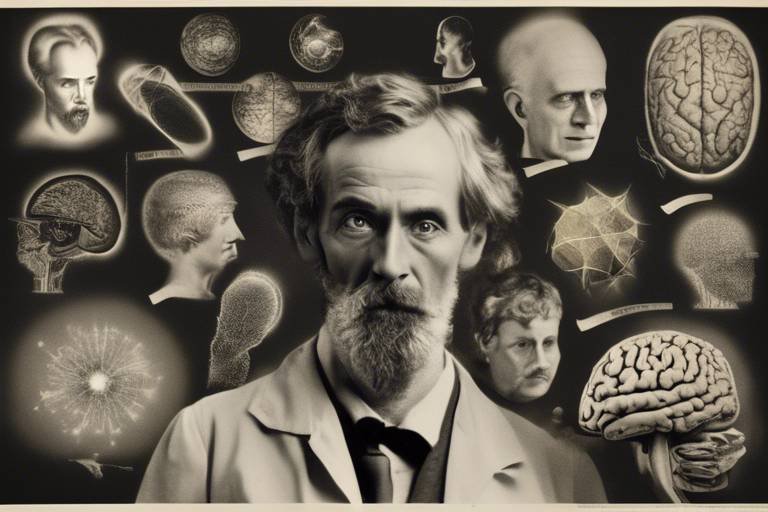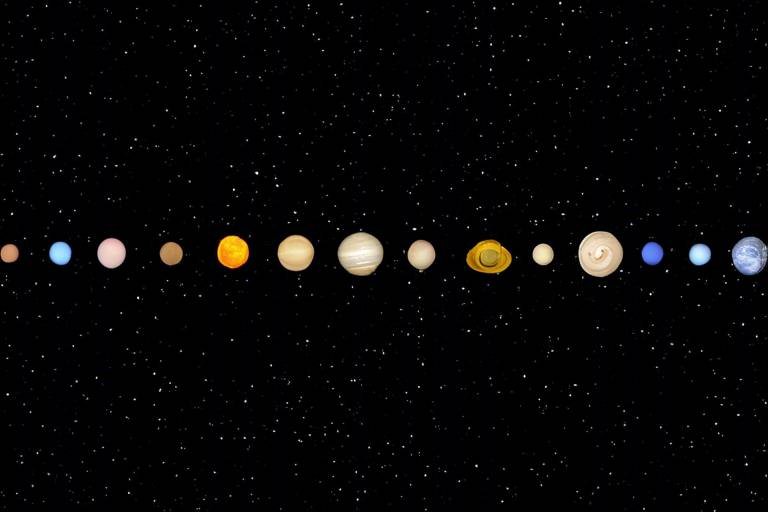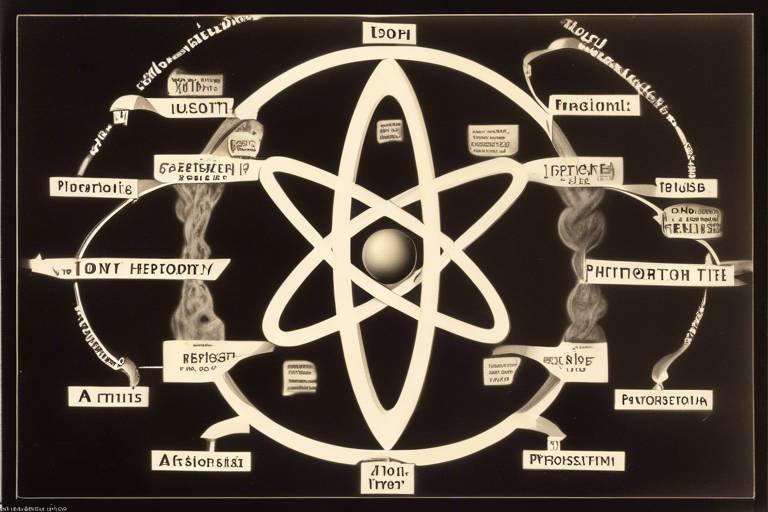Misconceptions about the Philosophy of Science
The philosophy of science is often shrouded in a cloud of misunderstandings, leaving many to question its relevance and importance. Some people view it as a dry, academic pursuit, disconnected from the vibrant world of scientific inquiry. Others mistakenly think it’s merely a collection of abstract theories that have no practical application. This article aims to peel back the layers of these misconceptions, revealing the rich interplay between philosophy and science. By understanding these dynamics, we can appreciate how philosophical questions and frameworks not only inform scientific practice but also enrich our comprehension of the universe.
At its core, the philosophy of science isn't just about pondering the meaning of life or the universe; it dives deep into the very foundations of how we understand and interpret scientific knowledge. Think of it as the backbone of science, providing the support and structure that allow scientific inquiry to stand tall. By addressing fundamental questions about what constitutes knowledge, how we acquire it, and what it means to say something is 'true,' philosophy helps to clarify the principles that guide scientific exploration.
However, many still conflate philosophy with mere speculation, assuming that philosophers sit in ivory towers, disconnected from the practical realities of scientific work. This misunderstanding overlooks the fact that philosophical analysis can illuminate the implications of scientific theories and methodologies. For instance, when scientists propose a new theory, it’s philosophy that often helps to unpack the broader significance of that theory, scrutinizing its assumptions and potential consequences.
Additionally, the relationship between philosophy and science is not one of opposition but rather one of collaboration. Just as a compass guides a traveler through uncharted territory, philosophy provides scientists with the conceptual tools necessary to navigate complex ideas and ethical dilemmas. In this way, philosophy acts as a guiding light, illuminating the path forward in scientific inquiry and ensuring that we don’t lose sight of the ethical implications of our discoveries.
To further clarify these misconceptions, let’s explore some of the most common misunderstandings surrounding the philosophy of science. These include the belief that philosophy and science are mutually exclusive, the misinterpretation of scientific theories as mere hypotheses, and the overly narrow view of empiricism. By addressing these points, we can better appreciate the intricate dance between these two fields, which ultimately leads to a more nuanced understanding of both.
- What is the philosophy of science?
The philosophy of science examines the assumptions, foundations, and implications of science, addressing questions about scientific reasoning and the nature of scientific knowledge.
- How does philosophy inform scientific practice?
Philosophy provides critical frameworks for understanding scientific theories, guiding ethical considerations, and encouraging critical thinking about scientific discoveries.
- Are philosophy and science mutually exclusive?
No, they are interconnected fields that inform and enrich each other’s methodologies and inquiries.

Understanding the Philosophy of Science
The philosophy of science is a captivating field that dives deep into the very essence of scientific inquiry. It’s not just about crunching numbers or running experiments; it’s about understanding the foundations, methods, and implications of science itself. Have you ever wondered why certain scientific theories hold more weight than others? Or what makes a hypothesis worthy of exploration? These questions are at the heart of the philosophy of science.
At its core, the philosophy of science addresses fundamental questions about scientific reasoning and the nature of scientific knowledge. It seeks to clarify what we can know through science and how we come to know it. This exploration is crucial because it helps us understand the limits and possibilities of scientific inquiry. For instance, consider the classic debate between realism and anti-realism. Realists argue that scientific theories aim to describe the world as it is, while anti-realists maintain that theories are merely useful tools for predicting phenomena. This philosophical inquiry shapes how we interpret scientific findings and their implications in the real world.
Moreover, the philosophy of science is not an isolated discipline. It intersects with various fields, including ethics, sociology, and history. This intersectionality enriches our understanding of science and its role in society. For example, when we think about the ethical implications of scientific research, we must consider the philosophical questions surrounding morality and responsibility. How do we ensure that scientific advancements benefit humanity without causing harm? This is where philosophy steps in, guiding scientists to think critically about their work.
To further illustrate the significance of philosophy in science, let’s look at some key areas it influences:
- Scientific Methodology: The philosophy of science critiques and refines the methods scientists use, ensuring they remain robust and relevant across different disciplines.
- Theoretical Frameworks: It helps in constructing and evaluating the theoretical frameworks that underlie empirical research, allowing scientists to interpret their findings within a broader context.
- Ethical Considerations: Philosophical discussions about ethics ensure that scientific practices adhere to moral standards, addressing dilemmas that may arise during research.
In summary, understanding the philosophy of science is essential for anyone engaged in scientific inquiry. It not only enhances our comprehension of scientific methods and theories but also encourages a more thoughtful approach to the ethical implications of research. By bridging the gap between science and philosophy, we can foster a deeper appreciation for the scientific enterprise and its impact on our world.
What is the philosophy of science?
The philosophy of science explores the foundations, methods, and implications of science, addressing questions about scientific reasoning and knowledge.
How does philosophy influence scientific research?
Philosophy shapes scientific inquiry by providing critical frameworks for understanding theories, ethics, and methodologies.
Is science and philosophy mutually exclusive?
No, science and philosophy often inform each other, enriching methodologies and enhancing our understanding of both fields.

Common Misconceptions
When it comes to the philosophy of science, there are a plethora of misconceptions that often muddy the waters of understanding. Many individuals mistakenly equate philosophy of science with mere scientific practice, thinking it’s just a fancy term for what scientists do in labs. This couldn’t be further from the truth! Philosophy of science digs deep into the foundations, methods, and implications of scientific inquiry, asking the big questions that often get overlooked in the hustle and bustle of research.
One of the most prevalent misunderstandings is the idea that philosophy and science are like oil and water—they just don’t mix. In reality, these two fields are more like peanut butter and jelly; they complement each other beautifully. Philosophy provides a critical lens through which we can examine scientific concepts, theories, and methodologies, enriching our understanding of the scientific landscape. Without this philosophical perspective, we risk becoming lost in a sea of data without a compass to guide us.
Another common misconception revolves around the nature of scientific theories. Some people argue that theories are just glorified guesses or hypotheses. However, this view fails to recognize the rigorous philosophical analysis that goes into developing and validating scientific theories. In fact, a well-established scientific theory is like a well-constructed house; it’s built on strong foundations and is capable of withstanding storms of scrutiny. Philosophy helps clarify the significance and implications of these theories, ensuring they are not just empty constructs.
Moreover, many individuals fall into the trap of viewing empiricism as the sole valid approach to science. While empirical methods are indeed crucial, this narrow view overlooks the importance of theoretical frameworks and philosophical underpinnings that guide empirical research. It’s like trying to drive a car without understanding how the engine works; you might get somewhere, but you’ll miss out on the full experience of the journey. Philosophy provides the roadmap, helping scientists navigate the complex terrain of inquiry.
Lastly, there’s a widespread belief that the scientific method is a rigid, one-size-fits-all formula. This misconception is particularly damaging, as it suggests that science operates in a vacuum, devoid of creativity and flexibility. In truth, the scientific method is more like a jazz improvisation—structured yet adaptable, allowing for different rhythms and variations depending on the context. Different disciplines and research areas require unique approaches, and philosophy plays a key role in shaping these methodologies.
Understanding these common misconceptions is essential for anyone interested in the philosophy of science. By recognizing the interplay between philosophy and science, we can foster a more nuanced appreciation for how scientific inquiry is conducted and how it evolves over time. In the end, embracing the philosophical dimensions of science not only enhances our understanding but also promotes a more informed and critical approach to scientific discourse.

Philosophy vs. Science
When we think about philosophy and science, it’s easy to imagine them as two distinct realms, each with its own set of rules and practices. However, this perception is not only misleading but also overlooks the profound ways in which these disciplines interact and enrich one another. Philosophy is often seen as the abstract, pondering the fundamental questions of existence, knowledge, and ethics, while science is viewed as the practical, grounded in experimentation and empirical data. But what if I told you that these two fields are more like dance partners than rivals?
To understand their relationship, let’s consider how philosophy provides the framework for scientific inquiry. Scientists often rely on philosophical principles to formulate their hypotheses and interpret their findings. For instance, when a scientist posits a theory, they are not just making a guess; they are engaging in a philosophical exercise that requires a deep understanding of concepts like causation, probability, and the nature of reality. This philosophical groundwork helps to shape the questions scientists ask and the methods they employ.
Moreover, the scientific method itself is steeped in philosophical thought. The principles of falsifiability, reproducibility, and empiricism—all cornerstones of scientific practice—are derived from philosophical discussions. Without these philosophical underpinnings, the scientific method would lack the rigor and structure that makes it so effective. So, the next time you think about philosophy and science, remember that they are not opposing forces but rather two sides of the same coin, each enhancing the other’s ability to uncover the truths of our world.
It’s also worth noting that the questions posed by philosophy can lead to groundbreaking scientific discoveries. For example, the philosophical inquiry into the nature of consciousness has spurred countless scientific investigations into the workings of the brain. This interplay highlights how philosophical questions can drive scientific exploration, pushing the boundaries of what we know.
In conclusion, rather than viewing philosophy and science as separate entities, we should celebrate their interdependence. They are like two best friends who challenge each other, support each other, and ultimately grow together. By embracing this relationship, we can foster a more holistic understanding of both disciplines and their contributions to human knowledge.
- Is philosophy necessary for scientific progress? Absolutely! Philosophy provides the critical thinking and ethical frameworks that guide scientific exploration.
- Can science exist without philosophy? While science can operate on empirical data alone, it often lacks the depth and context that philosophical inquiry provides.
- How do philosophical questions influence scientific research? Philosophical questions can shape the direction of research, prompting scientists to explore new areas and rethink established theories.

The Role of Theories
Theories in science are often misunderstood, with many people thinking of them as mere guesses or untested hypotheses. However, this perspective greatly underestimates the profound role that theories play in the scientific landscape. A scientific theory is not just a collection of ideas; it is a robust framework that organizes and interprets a vast amount of empirical data. Think of it as the blueprint of a complex building, where every theory provides a structured way to understand and predict phenomena in the natural world.
To clarify the significance of theories, it’s essential to recognize that they are built upon rigorous testing and validation. Unlike a hypothesis, which is a starting point for investigation, a theory has undergone extensive scrutiny and has withstood numerous attempts to falsify it. This process is akin to forging steel; only the strongest and most resilient theories emerge from the heat of scientific inquiry. For instance, the theory of evolution by natural selection is not merely a hypothesis; it is a comprehensive framework that explains the diversity of life on Earth, supported by an overwhelming body of evidence from various fields such as genetics, paleontology, and ecology.
Moreover, theories serve several critical functions in science:
- Explanatory Power: Theories help explain why certain phenomena occur, providing a deeper understanding of the underlying mechanisms.
- Predictive Capability: A robust theory allows scientists to make predictions about future observations or experiments, which can be tested and verified.
- Integration of Knowledge: Theories unify disparate observations and findings into a coherent framework, making it easier to understand complex interactions.
In addition to their foundational role, theories also invite philosophical analysis, prompting questions about their implications and limitations. This is where the philosophy of science comes into play, as it encourages scientists to reflect on the assumptions that underlie their theoretical frameworks. For example, consider the implications of quantum mechanics. Theories in quantum physics challenge our classical intuitions about reality, leading to philosophical debates about determinism, causality, and the nature of existence itself.
In summary, theories are the backbone of scientific inquiry, providing structure, coherence, and depth to our understanding of the natural world. They are not static entities; rather, they evolve as new data emerges and as our understanding deepens. Recognizing the vital role of theories helps us appreciate the intricate dance between empirical research and philosophical reflection, ultimately enriching our scientific endeavors.
- What is the difference between a hypothesis and a theory?
A hypothesis is a tentative explanation that can be tested through experimentation, while a theory is a well-substantiated explanation based on a body of evidence that has stood up to repeated testing.
- Can a scientific theory be proven true?
In science, theories cannot be proven true in an absolute sense; they can only be supported by evidence. New evidence may lead to the revision or rejection of a theory.
- How do theories influence scientific research?
Theories guide research by providing frameworks for generating hypotheses, designing experiments, and interpreting data. They help scientists focus their inquiries and make sense of their findings.

Empiricism Misunderstood
When people hear the term empiricism, they often conjure up images of scientists in lab coats, meticulously collecting data and conducting experiments. It's easy to see why one might think that empiricism is the sole pathway to scientific truth. However, this perception is a bit like looking at a beautiful painting and only noticing the frame. In reality, empiricism is just one piece of a much larger puzzle that includes theoretical frameworks and philosophical considerations.
Empiricism, at its core, emphasizes knowledge derived from sensory experience. This approach has undoubtedly propelled many scientific advancements. Yet, it is crucial to understand that empirical data alone cannot provide a complete understanding of scientific phenomena. For instance, consider the theory of gravity. While we can observe objects falling and measure their acceleration, the deeper questions about why gravity exists or how it operates in different contexts require philosophical inquiry. Thus, to fully grasp scientific concepts, one must appreciate the interplay between empirical evidence and theoretical interpretation.
Moreover, many people mistakenly believe that empiricism dismisses the role of theoretical science. This is far from the truth. Theories often guide empirical research by framing the questions scientists ask and the methods they use. Without theories, our empirical observations would be like wandering in a maze without a map—informative but ultimately directionless. For example, the theory of evolution provides a robust framework that allows scientists to interpret various biological phenomena, guiding research and experimentation in a meaningful way.
It's also important to note that while empiricism values data and observation, it does not inherently provide a way to evaluate the validity or significance of that data. This is where philosophy steps in, asking critical questions about the implications of empirical findings. For instance, if we discover a new species, empirical data can tell us about its characteristics, but philosophical analysis can help us explore its place in the ecosystem and its ethical implications for conservation.
In summary, while empiricism is undeniably vital to the scientific process, it is not the only lens through which we should view scientific inquiry. Recognizing the limitations of a purely empirical approach allows us to appreciate the rich tapestry of knowledge that combines both empirical evidence and philosophical thought. By embracing this broader perspective, we can foster a more nuanced understanding of science and its implications for our world.
- What is empiricism? Empiricism is a philosophical approach that emphasizes knowledge gained through sensory experience and observation.
- Why is empiricism important in science? It provides a foundation for collecting data and testing hypotheses, which are essential for scientific advancement.
- Can science exist without empiricism? While empirical evidence is crucial, theoretical frameworks and philosophical inquiries are also necessary for a complete understanding of scientific phenomena.
- How does philosophy influence scientific research? Philosophy helps clarify the implications of scientific findings and guides ethical considerations in research practices.

Scientific Methodology
The concept of scientific methodology is often shrouded in misconceptions, leading many to believe that it is a rigid set of steps, akin to a recipe that must be followed precisely to achieve a successful outcome. However, this notion couldn't be further from the truth. In reality, the scientific method is a dynamic and adaptable framework that varies across different fields and research contexts. Imagine a chef who modifies a recipe based on the ingredients at hand or the taste preferences of their guests; similarly, scientists tailor their methodologies to suit the unique demands of their investigations.
At its core, scientific methodology involves a series of processes designed to explore questions, test hypotheses, and draw conclusions based on empirical evidence. This process typically includes the following stages:
- Observation: Scientists begin by observing phenomena and identifying intriguing patterns or anomalies that spark curiosity.
- Question: Based on these observations, researchers formulate specific questions they seek to answer.
- Hypothesis: Next, they propose hypotheses—educated guesses that offer potential explanations for the observed phenomena.
- Experimentation: Through carefully designed experiments, scientists gather data to test their hypotheses, often employing various methods to ensure reliability and validity.
- Analysis: Once data is collected, it is analyzed to determine whether the results support or refute the original hypothesis.
- Conclusion: Finally, scientists draw conclusions based on their findings, which may lead to new questions and further investigation.
It’s essential to recognize that while these steps provide a general outline, the scientific method is anything but linear. Researchers often find themselves revisiting earlier stages, refining their hypotheses, or even rethinking their experimental designs based on preliminary results. This iterative process is what makes scientific inquiry so robust and responsive to new information. Think of it as a dance, where each step influences the next, allowing for spontaneity and adaptation rather than a strict regimen.
Moreover, the flexibility of the scientific method enables it to be applicable across various disciplines, from the hard sciences like physics and chemistry to the social sciences such as psychology and sociology. Each field may emphasize different aspects of the methodology depending on the nature of the questions being explored. For instance, while quantitative research may rely heavily on statistical analysis and controlled experiments, qualitative research might prioritize interviews and observational studies to gain deeper insights into human behavior.
In summary, understanding scientific methodology as a flexible and iterative process is crucial for both scientists and the general public. It demystifies the process of scientific inquiry and highlights the creativity and critical thinking that underpin the pursuit of knowledge. By embracing this understanding, we can foster a greater appreciation for the complexities of scientific research and the vital role it plays in advancing our understanding of the world.
- What is the scientific method? The scientific method is a systematic approach to inquiry that involves observation, hypothesis formulation, experimentation, analysis, and conclusion.
- Is the scientific method the same in all scientific disciplines? No, while the core principles remain, the application of the scientific method can vary significantly across different fields.
- Can the scientific method be applied to social sciences? Yes, the scientific method is applicable in social sciences, although it may involve different techniques like surveys and case studies.
- Why is flexibility important in scientific methodology? Flexibility allows researchers to adapt their approach based on new findings, ensuring that scientific inquiry remains relevant and accurate.

The Importance of Philosophy in Science
Understanding the role of philosophy in science is not just an academic exercise; it’s a vital component that enriches our comprehension of the natural world. Philosophy serves as the backbone that supports scientific inquiry by providing a framework for critical thinking and ethical considerations. Without this philosophical underpinning, scientific progress could easily veer into chaos, lacking the necessary guidelines for responsible exploration. Think of philosophy as the compass that helps scientists navigate the vast ocean of knowledge, ensuring they stay on course while exploring uncharted territories.
One of the most significant contributions of philosophy to science is its ability to shape the questions we ask. Philosophical inquiry encourages scientists to dig deeper, prompting them to consider not just how things work, but why they work the way they do. This leads to a richer understanding of scientific principles and fosters a culture of curiosity. For instance, when scientists ponder the implications of their findings, they engage in a philosophical dialogue that can lead to groundbreaking discoveries. It’s this interplay between philosophy and science that fuels innovation and drives progress.
Moreover, the ethical dimension of scientific research cannot be overstated. As we venture into complex areas such as genetic engineering, artificial intelligence, and environmental science, ethical considerations become paramount. Philosophy provides the tools to navigate these moral dilemmas, ensuring that scientists consider the broader implications of their work. For example, questions like:
- What are the potential consequences of our research?
- How do we balance scientific advancement with ethical responsibility?
- Who benefits from our discoveries, and at what cost?
These questions highlight the necessity of integrating ethical philosophy into scientific practice. By doing so, we can avoid potential pitfalls and ensure that our scientific endeavors contribute positively to society.
Furthermore, the philosophy of science plays a pivotal role in fostering a culture of skepticism and critical evaluation. Science thrives on questioning established theories and methodologies. Philosophical discourse encourages scientists to challenge the status quo, leading to a more rigorous examination of evidence and theories. This process of skepticism is essential for scientific advancement, as it prevents complacency and promotes continuous improvement. Just like a sculptor chisels away at a block of marble to reveal a masterpiece, philosophy helps refine scientific theories, making them sharper and more insightful.
In essence, the relationship between philosophy and science is akin to a dance; each discipline influences and enhances the other. As scientists grapple with complex problems, philosophical insights provide clarity and direction. This synergy not only enriches scientific inquiry but also ensures that the outcomes of research are meaningful and ethically sound. By acknowledging the importance of philosophy in science, we can cultivate a more holistic approach to understanding the world around us.
- Why is philosophy important in scientific research? Philosophy enhances critical thinking and ethical considerations, guiding scientists in their inquiries and interpretations.
- How does philosophy influence scientific progress? It encourages skepticism and reevaluation of established theories, fostering innovation and deeper understanding.
- What role do ethics play in science? Ethical discussions help navigate moral dilemmas in research, ensuring responsible practices.
- Can science exist without philosophy? While science can operate independently, the absence of philosophical guidance may lead to ethical oversights and a lack of critical inquiry.

Ethics in Scientific Research
When we think about scientific research, the first things that often come to mind are groundbreaking discoveries, innovative technologies, and the thrill of exploration. However, lurking beneath the surface of these exciting advancements is a critical component that often gets overshadowed: ethics. Ethics in scientific research isn't just a set of rules; it's the moral compass that guides researchers to conduct their studies responsibly and with integrity. Just as a ship needs a reliable compass to navigate through uncharted waters, scientists rely on ethical principles to steer their inquiries in a manner that respects human rights and societal norms.
One of the most pressing ethical concerns in scientific research is the treatment of human and animal subjects. Researchers must ensure that their studies do not cause harm and that participants are fully informed about the risks involved. This is where the concept of informed consent plays a crucial role. Imagine being a participant in a clinical trial; you would want to know exactly what you're getting into, right? Ethical guidelines require researchers to provide clear, comprehensible information about the study's purpose, procedures, risks, and benefits, allowing individuals to make informed choices about their participation.
Additionally, ethical considerations extend to issues of data integrity and honesty. In a world where the pressure to publish can lead to questionable practices, such as data fabrication or plagiarism, maintaining high ethical standards is paramount. Researchers must commit to transparency and honesty, ensuring that their findings are reliable and can be replicated by others. This not only upholds the integrity of the scientific community but also fosters public trust in scientific findings.
Moreover, ethical discussions in science also encompass broader societal implications. For instance, the development of technologies such as genetic engineering and artificial intelligence raises significant moral questions. Should we manipulate genes to eliminate diseases, or might that lead us down a slippery slope of eugenics? As scientists push the boundaries of knowledge, they must engage in philosophical debates about the potential consequences of their work. This is where philosophy and science intersect, reminding us that every scientific advancement carries with it a responsibility to consider its impact on humanity.
| Ethical Principle | Description |
|---|---|
| Informed Consent | Participants must be fully informed about the study and voluntarily agree to partake. |
| Data Integrity | Researchers must present their findings honestly and transparently. |
| Social Responsibility | Research should consider the broader societal implications and potential impacts. |
In conclusion, the role of ethics in scientific research cannot be overstated. It is not merely an add-on but a fundamental aspect that shapes the very essence of scientific inquiry. As we continue to explore the unknown, let us remember that with great power comes great responsibility. Embracing ethical principles ensures that the pursuit of knowledge does not come at the expense of humanity, paving the way for a future where science and ethics walk hand in hand.
- What is informed consent in research?
Informed consent is the process by which researchers provide potential participants with comprehensive information about a study, ensuring they understand the risks and benefits before agreeing to participate.
- Why is data integrity important in science?
Data integrity is crucial because it ensures that scientific findings are accurate and reliable, fostering trust in the scientific community and among the public.
- How do ethical considerations affect scientific progress?
Ethical considerations can guide researchers to conduct studies responsibly, ensuring that advancements benefit society while minimizing harm.

Impact on Scientific Progress
The philosophy of science is not just an abstract field of study; it profoundly influences the trajectory of scientific progress. You might wonder, how does something so seemingly detached from experimental data affect the way we conduct research? The answer lies in the foundational principles that philosophy provides, which serve as a compass guiding scientists through the murky waters of inquiry and discovery.
One of the most significant impacts of philosophy on scientific progress is its encouragement of critical thinking. In a world where information is abundant and sometimes misleading, the ability to analyze and question assumptions is invaluable. For instance, consider the concept of falsifiability, introduced by philosopher Karl Popper. This principle posits that for a theory to be considered scientific, it must be testable and potentially disprovable. This idea has led scientists to formulate hypotheses that can be rigorously tested, thereby advancing knowledge.
Additionally, philosophy fosters a spirit of skepticism that is essential for scientific advancement. It encourages scientists to challenge established norms and question the validity of existing theories. This is crucial because, without skepticism, we risk becoming complacent, accepting outdated ideas simply because they have been around for a long time. Historical examples abound where philosophical inquiry has led to revolutions in thought, such as the shift from Newtonian physics to Einstein's theories of relativity. Such shifts were not merely scientific; they were deeply philosophical, requiring a reevaluation of the very nature of space and time.
Moreover, the philosophy of science prompts scientists to engage in metascientific reflection. This means looking at the methods and assumptions underlying scientific research itself. By critically assessing the frameworks within which they operate, scientists can identify biases and limitations in their methodologies. For example, the debate surrounding the replication crisis in psychology has highlighted the need for more rigorous standards in research practices. Philosophical discussions around this issue have led to a reconsideration of how studies are designed and reported, ultimately aiming to enhance the reliability of scientific findings.
In terms of practical application, the philosophy of science also plays a role in shaping interdisciplinary research. By providing a common ground for dialogue, it allows scientists from different fields to collaborate more effectively. For instance, the integration of philosophy in fields like bioethics has led to more comprehensive approaches to issues such as genetic engineering and artificial intelligence. These discussions ensure that scientific advancements are not only innovative but also ethically sound.
In conclusion, the impact of philosophy on scientific progress is both profound and multifaceted. It cultivates critical thinking, promotes skepticism, encourages metascientific reflection, and facilitates interdisciplinary collaboration. By recognizing and embracing the philosophical dimensions of science, we can foster an environment where inquiry thrives, leading to breakthroughs that not only expand our knowledge but also enhance the ethical frameworks within which we operate. As we move forward, let us not forget that philosophy is not a barrier to scientific progress; rather, it is a vital ally that enriches our understanding of the universe.
- What is the philosophy of science?
The philosophy of science examines the foundations, methods, and implications of science, addressing questions about scientific reasoning and the nature of scientific knowledge.
- How does philosophy influence scientific research?
Philosophy encourages critical thinking, skepticism, and metascientific reflection, which are essential for scientific progress and innovation.
- Can philosophy and science coexist?
Absolutely! Philosophy and science often inform and enrich each other’s methodologies and inquiries, leading to a deeper understanding of both fields.
- Why is ethics important in scientific research?
Philosophical discussions about ethics guide responsible scientific practices and help address moral dilemmas that arise in research, ensuring that advancements benefit society as a whole.
Frequently Asked Questions
- What is the philosophy of science?
The philosophy of science is a field that investigates the foundations, methods, and implications of science. It addresses fundamental questions about how scientific reasoning works and what constitutes scientific knowledge, helping to clarify the principles underlying scientific inquiry.
- Are philosophy and science mutually exclusive?
No, they are not mutually exclusive! In fact, philosophy and science often complement each other. While science focuses on empirical observations and experiments, philosophy provides critical frameworks that help interpret these findings and explore the implications of scientific theories.
- What role do theories play in science?
Theories in science are not just mere hypotheses; they are well-substantiated explanations that have been rigorously tested and validated. Philosophical analysis helps us understand the significance of these theories and the implications they have for our understanding of the world.
- Is empiricism the only valid approach to science?
Many people mistakenly believe that empiricism is the sole approach to science. However, it’s essential to recognize that theoretical frameworks and philosophical underpinnings are equally important as they guide and enrich empirical research.
- Is the scientific method a strict formula?
Not at all! The scientific method is often perceived as a rigid formula, but it is actually a flexible framework that adapts to different disciplines and research contexts. This adaptability allows scientists to approach problems creatively and effectively.
- How does philosophy influence scientific ethics?
Philosophical discussions about ethics are crucial in guiding responsible scientific practices. They help address moral dilemmas that arise in research, ensuring that scientific endeavors are conducted with integrity and respect for human and environmental considerations.
- What is the impact of philosophy on scientific progress?
The philosophy of science significantly drives scientific progress by fostering critical thinking and skepticism. It encourages scientists to reevaluate established theories and methodologies, leading to breakthroughs and advancements in various fields.



















